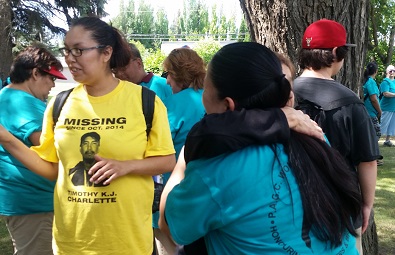Each year, the number of heartbreaking stories heard at the ‘Honouring Our Brothers and Sisters Memorial Walk’ rises, but organizers want to put a stop to that.
The walk was first held 12 years ago, hosted by the Prince Albert Grand Council Women’s Commission. Chairwoman Shirley Henderson told a crowd of about 100 people who have lost loved ones, the event began “to shed light on the plight of our people with regards to murder, missing people, and the abuse.
“It’s sad to say that we have to continue these walks but hopefully one day will come we won’t have to have a memorial walk,” she said.
Leaders from FSIN, PAGC, Prince Albert Police, and City Council spoke in front of City Hall before embarking on the emotional walk.
The issue of family violence came up throughout the speeches – including the need for PAGC to have more than one family violence worker to serve its 39,000 members.
FSIN Vice-Chief Kim Jonathan said one way to honour the memory of the missing and murdered is to take care of the children impacted by these painful losses. This is something she said FSIN addressed at the Ottawa roundtable on Missing and Murdered Indigenous Women.
“We cannot forget the children that are left behind by our murdered and our missing mothers and fathers,” she said. “Because it’s our responsibility to love, protect, honour and fulfill their dreams and make their futures prosperous.”
The day was “heavy and full of grief,” said Prince Albert Police Chief Troy Cooper, but he said the community needs to remember bright faces of its youth during the walk.
Cooper shed some light on the painful reality of policing.
“Today we’re gonna be sending, five or six different times, we’ll send police officers to domestic violence calls and we’ll do it again tomorrow. 1,800 times we’ll do that this year, in our little city 1,800 times a year,” he said.
Those reports of violence and more than 1,000 missing people reports per year are mostly related to high-risk individuals.
Cooper said he needs to approach these people as more than a statistic.
“They’re not numbers in a government report. They are people we knew. They are very literally our brothers and sisters, members of our community, people that we were responsible to take care of,” he said. “I don’t have an opportunity to participate in change, I have a responsibility to that. It’s a duty. It’s my obligation.”
Cooper said systemic changes are needed to address poverty, and one of those examples is recent changes to prostitution laws that allow police to work with them instead of arresting them.
He said the memorial walk makes a statement against injustice that will hopefully bring safety and equality to Prince Albert.
